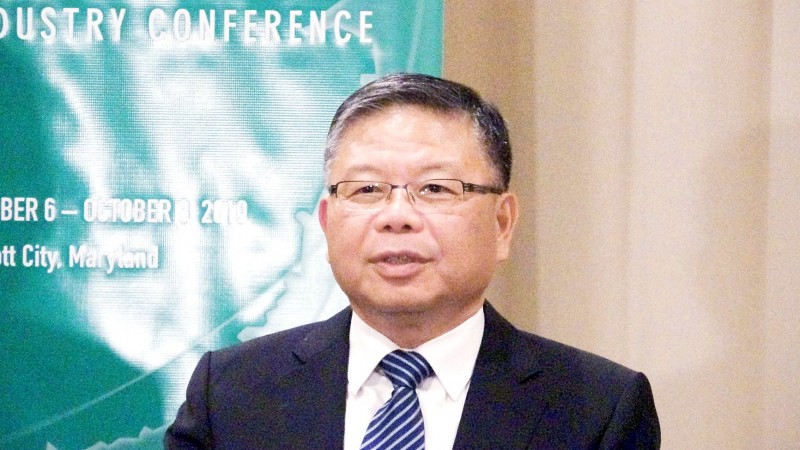《TAIPEI TIMES》 Defense official calls for US logistics support

Vice Minister of National Defense Chang Guan-chung talks to the media on Monday after giving a speech at the annual US-Taiwan Defense Industry Conference in Ellicott City, Maryland. Photo: CNA
/ Staff writer, with CNA, ELLICOTT CITY, Maryland
A Taiwanese defense official has urged the US to provide Taipei with long-term logistics support in addition to selling it arms to bolster its defense capabilities.
“We expect that our arms acquisition will not be limited to the weapons themselves, but will include long-term logistic support,” Vice Minister of National Defense Chang Guan-chung (張冠群) told the US-Taiwan Defense Industry Conference in Ellicott City, Maryland, on Monday.
Chang said the support is crucial and should be a focus of future Taiwan-US cooperation.
US businesses could take a step further in working with Taiwanese companies by building depot-level maintenance capacity in Taiwan, Chang said, citing the US’ agreement to sell Taiwan M1A2T Abrams tanks and F-16V jets.
“This will lower maintenance costs and raise maintenance efficiency for better operational sustainability,” Chang said.
“Building a local maintenance supply chain will provide lifecycle-integrated logistic support to countries in the region and raise the operational rate of US-made equipment in the region,” he added. “This would surely be mutually beneficial for us to share our resources.”
Taiwan is a peacemaker in the Indo-Pacific region, Chang told the annual conference.
Taiwan holds a critical geostrategic position between the Asian continent and the Pacific, and the US’ Indo-Pacific strategy only accentuates Taiwan’s political, military and economic importance, he said.
As a successful example of the third wave of democratization and a source of inspiration for people in China and developing countries, “Taiwan’s pursuit of peace and democracy is in sharp contrast to mainland China, and makes us worthy of the trust of the US and countries in the region,” Chang said.
However, Taiwan, in facing a growing military threat from China, “will not be engaged in an arms race,” he said.
Taiwan’s strategic direction is to build a “resolute defense and multi-domain deterrence,” Chang said, adding that the nation’s overall defense concept is focused on “force protection” and the “destruction of the enemy at the landing beach.”
“We intend to make use of the natural buffer zone of the Taiwan Strait and our geostrategic advantages,” he said. “We adopt innovative and asymmetric concepts to focus investment on systems that are mobile, hard to find, agile, cheap, numerous, survivable and operationally effective.”
By building capabilities to seize battlefield initiatives, “we expect to meet our operational objectives of ‘defeating the enemy’s mission to occupy Taiwan,’” Chang added.
The conference, in its 18th year, finished yesterday, with participants discussing Taiwan’s overall defense concept and how emerging technologies could affect the concept’s implementation.
Asked about Chang’s call for logistics support from Washington, National Security Council Deputy Secretary-General York Chen (陳文政) said that the US shares the intention to build a logistics supply chain with Taiwanese companies.
“This will be the focus of future cooperation,” he added.
There would be “substantial achievements” ahead in cooperation between the US and Taiwanese companies on security maintenance, Chen said, without elaborating, because of “commercial secrets.”
“Third wave of democratization,” a term popularized by Harvard University political scientist Samuel Huntington, describes a global trend that has seen more than 60 countries undergo some form of democratic transition since Portugal’s “Carnation Revolution” in 1974.
新聞來源:TAIPEI TIMES



















